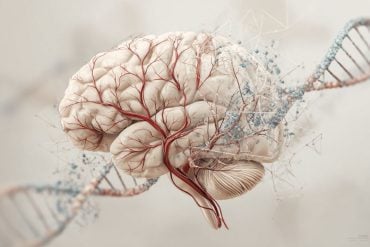Summary: Anosmia, or the loss of the sense of smell caused by long COVID is linked to changes in the brain that prevents correct olfactory processing.
Source: UCL
People living with long Covid who suffer from loss of smell show different patterns of activity in certain regions of the brain, a new study led by UCL researchers has found.
The research used MRI scanning to compare the brain activity of people with long Covid who lost their sense of smell, those whose smell had returned to normal after Covid infection, and people who had never tested positive for Covid-19.
Published in eClinicalMedicine, the observational study found that the people with long Covid smell loss had reduced brain activity and impaired communication between two parts of the brain which process important smell information: the orbitofrontal cortex and the pre-frontal cortex. This connection was not impaired in people who had regained their sense of smell after Covid.
The findings suggest smell loss, known as anosmia, caused by long Covid is linked to a change in the brain that stops smells from being processed properly. Because it’s clinically reversible, as shown in some subjects, it may be possible to retrain the brain to recover its sense of smell in people suffering the side effects of long Covid.

Dr Jed Wingrove (UCL Department of Medicine) the lead author of the study, said: “Persistent loss of smell is just one way long Covid is still impacting people’s quality of life – smell is something we take for granted, but it guides us in lots of ways and is closely tied to our overall wellbeing. Our study gives reassurance that, for the majority of people whose sense of smell comes back, there are no permanent changes to brain activity.”
Joint senior author, Professor Claudia Wheeler-Kingshott (UCL Queen Square Institute of Neurology), said: “Our findings highlight the impact Covid-19 is having on brain function. They raise the intriguing possibility that olfactory training – that is, retraining the brain to process different scents – could help the brain to recover lost pathways, and help people with long Covid recover their sense of smell.”
Researchers say their findings also suggest that the brains of people with long Covid smell loss might be compensating for this lost sense by boosting connections with other sensory regions: their brains had increased activity between the parts of the brain that process smell and areas that process sight (the visual cortex).
“This tells us that the neurons that would normally process smell are still there, but they’re just working in a different way,” said Dr Wingrove.
Professor Rachel Batterham (UCL Division of Medicine), also joint senior author of the study said: “This is the first study to our knowledge that looks at how brain activity changes in people with long Covid smell loss. It builds on the work we undertook during the first wave of the pandemic, which was one of the first to describe the link between Covid-19 infection with both loss of smell and taste.”
Funding: The study was funded by the National Institute for Health and Care Research (NIHR).
About this long-COVID and neuroscience research news
Author: Henry Killworth
Source: UCL
Contact: Henry Killworth – UCL
Image: The image is in the public domain
Original Research: Open access.
“Aberrant olfactory network functional connectivity in people with olfactory dysfunction following COVID-19 infection: An exploratory, observational study” by Jed Wingrove et al. eClinicalMedicine
Abstract
Aberrant olfactory network functional connectivity in people with olfactory dysfunction following COVID-19 infection: An exploratory, observational study
Background
Olfactory impairments and anosmia from COVID-19 infection typically resolve within 2–4 weeks, although in some cases, symptoms persist longer. COVID-19-related anosmia is associated with olfactory bulb atrophy, however, the impact on cortical structures is relatively unknown, particularly in those with long-term symptoms.
Methods
In this exploratory, observational study, we studied individuals who experienced COVID-19-related anosmia, with or without recovered sense of smell, and compared against individuals with no prior COVID-19 infection (confirmed by antibody testing, all vaccine naïve). MRI Imaging was carried out between the 15th July and 17th November 2020 at the Queen Square House Clinical Scanning Facility, UCL, United Kingdom. Using functional magnetic resonance imaging (fMRI) and structural imaging, we assessed differences in functional connectivity (FC) between olfactory regions, whole brain grey matter (GM) cerebral blood flow (CBF) and GM density.
Findings
Individuals with anosmia showed increased FC between the left orbitofrontal cortex (OFC), visual association cortex and cerebellum and FC reductions between the right OFC and dorsal anterior cingulate cortex compared to those with no prior COVID-19 infection (p < 0.05, from whole brain statistical parametric map analysis). Individuals with anosmia also showed greater CBF in the left insula, hippocampus and ventral posterior cingulate when compared to those with resolved anosmia (p < 0.05, from whole brain statistical parametric map analysis).
Interpretation
This work describes, for the first time to our knowledge, functional differences within olfactory areas and regions involved in sensory processing and cognitive functioning. This work identifies key areas for further research and potential target sites for therapeutic strategies.
Funding
This study was funded by the National Institute for Health and Care Research and supported by the Queen Square Scanner business case.







